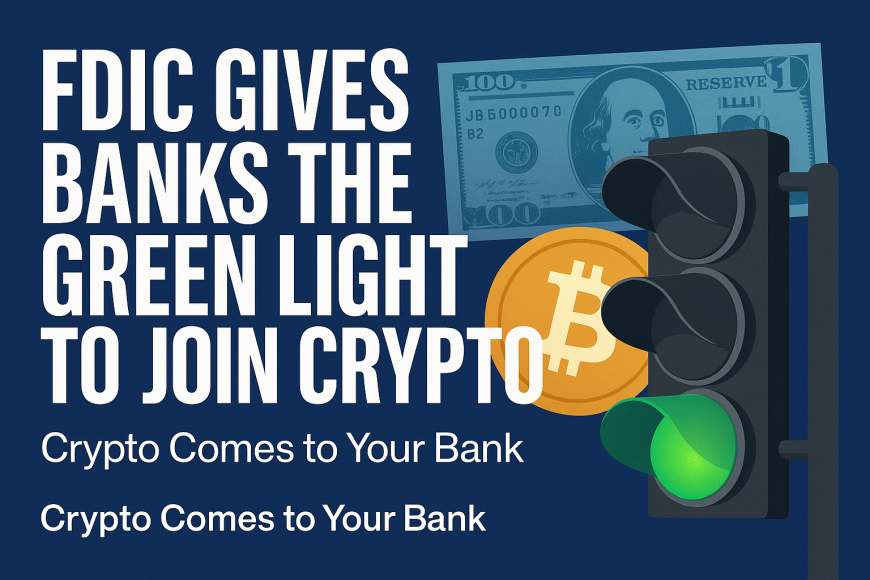Big Banks Just Got the Green Light to Join Crypto — What That Means for Everyday Users
U.S. banks no longer need special approval to offer crypto services. Here’s how this new FDIC rule could bring Bitcoin, Ethereum, and altcoins straight to your banking app — and why it matters for beginners.

The crypto space just got a major boost — and most people don’t even realize it yet.
In a move that could change how millions of people interact with digital assets, the Federal Deposit Insurance Corporation (FDIC) announced that U.S. banks no longer need special permission to engage in crypto-related activities.
This might sound like a technical policy update, but here’s the bottom line:
Your everyday bank might soon let you buy, sell, and hold crypto directly.
Let’s unpack why this matters, what’s changing, and how this could impact you — especially if you're new to crypto or still sitting on the sidelines.
What Changed?
Until now, U.S. banks have had to get formal approval from the FDIC before doing anything related to crypto — whether that was offering Bitcoin services, partnering with crypto exchanges, or building blockchain tools.
But now? They can go ahead as long as they manage the risks properly.
This doesn’t mean every bank is jumping into crypto tomorrow. But it removes a huge layer of red tape. The door is wide open.
Why This Matters for Beginners
Let’s say you’re new to crypto. Maybe you’ve wanted to buy Bitcoin but weren’t sure which platform to trust. Maybe you're worried about scams, wallet management, or taxes. Now imagine this:
- You open your bank app, and there’s an option to buy ETH next to your savings account.
- When your paycheck hits, a portion automatically goes into a secure, FDIC-backed crypto wallet.
- You don't need to use a separate app, memorize seed phrases, or send money to unknown exchanges.
This is the kind of simplicity the crypto world has been missing — and now it’s finally becoming possible.
From Exchanges to Banks: Why This Shift Is Huge
Until now, most people have entered crypto through centralized exchanges like Coinbase, Binance, or Kraken. These platforms have their pros and cons, but let’s be honest: for many people, they feel risky or too complex.
Now imagine your own bank — the one you trust with your mortgage or debit card — offering the same services. For beginners, this reduces fear and confusion dramatically.
What Banks Might Offer Soon
Here’s what could become mainstream banking features in 2025 and beyond:
- Buy/sell crypto directly from your bank account
- Earn yield from staking or interest-bearing crypto accounts
- Crypto debit cards tied to your wallet
- Tax reporting and portfolio summaries in-app
- Instant transfers between fiat and crypto balances
Some banks were already experimenting with crypto behind the scenes — now they’re free to build faster.
But... What’s the Catch?
This doesn’t mean banks will become DeFi protocols overnight. You’ll still be trading convenience for control.
In a bank-managed system:
- The bank owns the private keys, not you
- Your access can be frozen, limited, or restricted
- Yields might be lower than in decentralized platforms
But for most beginners, the tradeoff is worth it. You get peace of mind, better UI, and lower learning curves — while still gaining exposure to digital assets.
This Isn’t the Only Sign of Crypto Going Mainstream
We're seeing other institutions jump in fast:
- Fidelity is raising billions to buy Solana
- Interactive Brokers just added SOL, XRP, ADA, and DOGE
- Memecoins are going viral again — but faster and smarter
So whether you're looking for a safe way to start with Bitcoin or want to dabble in trending altcoins, the ecosystem is evolving fast — and now the banks are finally allowed to join the party.
Final Thoughts: The Crypto Onboarding Revolution Has Begun
For crypto to go truly mainstream, it has to become invisible. Seamless. Easy. Just another tab in your banking app.
This FDIC rule change brings us one giant step closer to that reality.
If you’ve been holding back because the space felt too complex or unsafe, pay attention over the next few months. Banks, apps, and wallets are all racing to become your entry point.
Crypto isn’t coming someday. It’s here, and it might be in your bank account sooner than you think.



